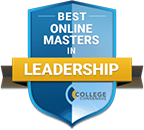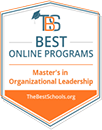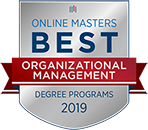
M.A. in Organizational Leadership
Unlock Your Leadership Potential Through Regent’s MAOL Degree Program
What’s your leadership style? How do you bring out the best in yourself and your team? Taught from a Christian worldview, Regent’s Master of Arts in Organizational Leadership (MAOL) is an in-demand graduate program that will help you develop practical leadership skills through real-life situations. Gain a foundation in business theory, with strategies to keep your organization moving forward.
IMPROVE YOUR MARKETABILITY WITH AN MAOL PROGRAM
Master the organizational leadership skills employers are seeking, including motivation, creativity, vision, strategic planning and technology.
INCREASE YOUR IMPACT IN THE WORKPLACE & BEYOND
Position yourself to influence public policy and social change as you learn to think globally.
INSPIRE OTHERS THROUGH SERVANT LEADERSHIP
Gain expertise to motivate teams and confidently guide those you lead and serve through our Master’s in Organizational Leadership degree program.
CUSTOMIZE YOUR MAOL ACCORDING TO YOUR CAREER GOALS
You can customize your MAOL to better understand the intricacies of leading effectively in a corporate, not-for-profit, ministry, healthcare or government setting.
Regent has been ranked among Top National Universities by the U.S. News & World Report for two consecutive years (2019 and 2020). Our programs have also been ranked by it among the Top 5 Best Graduate Online Business (Non-MBA) Programs in Virginia for 6 years in a row. Experience the Regent difference through our MAOL degree program.
On completing the MAOL degree, you will be able to:
- Apply organizational leadership elements in ethics, motivation, creativity, vision, strategic planning, teamwork, group development, technology and organizational development.
- Serve as a confident leader who masterfully integrates best practices to increase employee engagement, retention and productivity.
- Gain an insight into organizational trends through the application of qualitative and quantitative research methods and data analysis.
- Apply principles of biblical entrepreneurship and management.
- Evaluate global economic needs, opportunities, and resources required to build kingdom-strategic business ventures.
Career Opportunities
- Analytics & Strategic Planning
- C-level Leadership
- HR Administration, Mediation & Consulting
- Corporate Training, Consulting or Coaching
- Ministry Leadership & Missions
- Not-for-profit Development & Administration
The Master's in Organizational Leadership (MAOL) – Global Business Leadership & Communication will help you develop key leadership and strategic communication skills. It focuses on ethics, motivation, strategic planning, and on developing solutions for real-world issues through research.
Learn MoreThe Master's in Organizational Leadership (MAOL) – Healthcare Management will prepare you for a successful health administration career. You'll gain expertise in healthcare law, best practices and how to manage change – all from a Christian worldview.
Learn MoreThe Master's in Organizational Leadership (MAOL) – Human Resource Management program will introduce you to evidence-based strategies that ensure high performance from your organization and staff. Be equipped to deliver practical solutions to organizational challenges.
Learn MoreThe Master's in Organizational Leadership (MAOL) — Interdisciplinary Studies program allows you to self-design your course lineup from a broad spectrum of subject areas—all taught from a Christian perspective. It will help you master key organizational leadership elements such as vision, motivation and strategic planning.
Learn MoreThe Master's in Organizational Leadership (MAOL) – Leadership Coaching & Mentoring will enable you to be positioned as a results-driven trainer, coach or consultant in a variety of career fields. Taught from a biblical worldview, it will equip you to be effective in the leadership coaching process.
Learn MoreThe Master's in Organizational Leadership (MAOL) – Not-for-Profit Management fuses business best practices with the daily complexities of a nonprofit. Taught from a Christian perspective, this program gives you the leadership skills and spiritual wisdom to help your organization make a meaningful difference.
Learn MoreThe Master's in Organizational Leadership (MAOL) – Organizational Development Consulting focuses on the role of leadership in developing and guiding strategic change. You'll explore consulting challenges and tools to effectively audit, assess and implement changes required for organizational development.
Learn MoreThe Master's in Organizational Leadership (MAOL) – Servant Leadership program focuses on how servant leadership works in the contemporary world. Develop ethical decision-making and leadership skills that transcend career fields from ministry and not-for-profit to healthcare, government, business and beyond.
Learn MoreThe Master's in Organizational Leadership (MAOL) – Small Business Technology Management program will equip you to guide your organization in the effective use of technological developments, tools and analysis for informed organizational planning. Explore leadership elements from a Christian perspective and develop solutions for real-world issues through research.
Learn MoreThe Master's in Organizational Leadership (MAOL) – Social Entrepreneurship program explores how relevant, entrepreneurial business models can prepare you to advance as a social entrepreneur, leader in social-purpose organizations, philanthropist or director of volunteers in the social sector. You will examine biblical perspectives of servant leadership and the advantages of service-focused business structures.
Learn MoreAn understanding of leadership from the wisdom literature from the evolution of leadership/management thought from 1900 to the present. Leadership as a contingent/context-specific application and organizational problems that have leader- follower interaction as a cause.
Provides an understanding of organizational structure and organizational life-cycle development. Students learn the role of the leader as an organizational architect. The course examines the role of the Organizational Development (OD) specialist and how leaders intervene in their own organizations, as well as how consultants intervene in other organizations.
Qualitative and quantitative research methods and data analysis that leaders and consultants use in organizations with particular attention to interview and observation.
Explores the psychological contract between leader and follower that takes any of many forms between two people or between the leader and small groups. Students study group formation and group development, as well as the intricacies of coaching, mentoring, and discipling. Students study organizational behavior and explore how OB concepts affect leadership effectiveness.
Examines organizational communication, including dyadic, small group, formal and informal communication, as well as the relationship of communication to organizational satisfaction and effectiveness. In addition, students study how communication defers in leader-member exchange and mass-communication of charismatic leader/large group interaction.
Compares and contrasts strategic thinking with strategic planning and presents the value of both. Students study the leader’s role in organizational change – creating and preventing change, as well as determining the organization’s readiness for change. In addition, students explore the reasons for resistance to change and strategies for coping with resistance.
Technology as the study of tools and methods and explores how leaders help followers interact with tools and methods to accomplish the organization’s objectives. This includes job design, human-computer interaction, understanding how new technology should cause current tools and methods to change, and how to help followers through the adoption and diffusion of the innovation process.
Synthesizes the knowledge and skills learned throughout this program. This experience may be, but is not limited to, a guided project, (i.e., designing a new organization, analyzing an existing major organizational problem and recommending solutions or developing and testing a seminar), a master’s thesis or a publishable manuscript. Prerequisite: permission of instructor.
When applying to master’s or MBA programs in the School of Business & Leadership, the admissions committee will review your application materials for an admissions decision. Criteria reviewed by the admissions committee include:
- Academic achievement
- Vision clarity and alignment with program outcomes
- Writing quality
- Leadership experience
2020-2021 Semester Check-In Deadlines:
All new students are expected to check-in for the semester 2 weeks prior to the session start date. Students should apply, be accepted, enroll in their first courses, and confirm a plan to pay for their courses prior to this date.
| Session | Semester Check-In | Session Start Date |
| Session A | Friday, August 14 | Monday, August 24 |
| Session M | Friday, September 11 | Monday, September 21 |
| Session B | Friday, October 16 | Monday, October 26 |
| Session C | Tuesday, January 5 | Monday, January 11 |
| Session T | Friday, January 29 | Monday, February 8 |
| Session D | Friday, March 5 | Monday, March 15 |
| Session E | Friday, April 30 | Monday, May 10 |
| Session F | Friday, June 11 | Monday, June 21 |
Prerequisites:
Master’s applicants must:
- Hold a bachelor’s degree from a regionally accredited institution or an equivalent degree from a foreign institution, as evaluated by a credential evaluating agency.
- Submit all application materials such that they are received by the deadline for the semester to which they are applying. Once the application requirements have been fulfilled, an admissions interview may be requested. Interviews are by invitation only.
Application Process:
1. Complete Your Online Application
Note: If you are unable to complete our application due to a disability, please contact our Admissions Office for assistance.
2. Pay Your $50 Application Fee
Pay the $50 nonrefundable application fee by check or money order mailed to Regent University, Enrollment Support Services, 1000 Regent University Drive, Virginia Beach, VA 23464.
3. Submit your Unofficial College Transcripts*
Unofficial transcripts from a U.S.-based school, indicating successful completion of a bachelor’s degree program, can be used for an admissions decision. Submit your unofficial transcript to apply@regent.edu using the subject line: SBL Master’s Application Pieces.
Non-U.S. transcripts must be evaluated by an NACES-approved company. See the International Admissions Checklist for details.
*Upon conditional acceptance to the program by review of unofficial transcripts, Regent University’s Admissions Office will attempt to obtain your official transcripts from your U.S. degree-granting institution, which indicate successful completion of a bachelor’s degree program. We will notify you if your previous institution will not release transcripts directly to us.
4. Complete an Admissions Questionnaire Regarding Your Professional Goals and Interests
5. Government-Issued ID
To ensure academic integrity, Regent University requires a copy of a government-issued ID. Please email a scanned copy or photograph of it to apply@regent.edu with the subject line: Government ID.
6. International Applicants
Visit the International Students Admissions page for additional admission requirements and to determine if you qualify as an international student.
Note: All items submitted as part of the application process become the property of Regent University and cannot be returned.
2019-20 Tuition Rates
| Degree Level / Program | Cost Per Credit Hour |
|---|---|
M.A. in Organizational Leadership | $675 per credit (In-state & Out-of-state) |
Student Fees Per Semester
| Application Fee | $50 (nonrefundable) |
| Enrollment Deposit | $100 |
| University Services Fee (Online Students) | $550 |
| RU Library Course Fee | $50 (one-time fee) |
2020-21 Tuition Rates
| Degree Level / Program | Cost Per Credit Hour |
|---|---|
M.A. in Organizational Leadership | $675 per credit (In-state & Out-of-state) |
Student Fees Per Semester
| Application Fee | $50 (nonrefundable) |
| Enrollment Deposit | $100 |
| University Services Fee (Online Students) | $600 |
| RU Library Course Fee | $50 (one-time fee) |
*Rates are subject to change at any time. The per-credit-hour tuition rate is for SBL master’s level courses only. Concentration courses taken from the other schools at Regent University are charged at that school’s tuition rate.
- B.A. in Communication Studies – Organizational Communication
- B.A. in Leadership Studies
- B.A. in Leadership Studies – Business
- B.A. in Leadership Studies – Christian Ministry
- B.S. in Christian Leadership & Management
- Doctor of Strategic Leadership (DSL)
- DSL – Ecclesial Leadership
- DSL – Entrepreneurial Leadership
- DSL – Global Consulting
- DSL – Healthcare Leadership
- DSL – Individualized
- DSL – Leadership Coaching
- DSL – Strategic Foresight
- DSL – Strategic Leadership
- M.A. in Law – Business
- MBA – Accounting
- MBA – Cybersecurity Management
- MBA – Entrepreneurship
- MBA – Finance & Investing
- MBA – General Management
- MBA – Global Business Leadership & Communication
- MBA – Innovation Management
- MBA – Leadership
- MBA – Marketing
- MBA – Master of Business Administration
- MBA – Master of Business Administration (Accelerated)
- MBA – Social Entrepreneurship
- M.Div. – Church Planting
- MPA – Public Leadership & Management
- M.S. in Business Analytics
- M.S. in Psychology – Industrial-Organizational Psychology
- M.S. in Psychology – Leadership Coaching
- Ph.D. in Organizational Leadership
- Ph.D. in Organizational Leadership – Ecclesial Leadership
- Ph.D. in Organizational Leadership – Entrepreneurial Leadership
- Ph.D. in Organizational Leadership – Human Resource Development
- Ph.D. in Organizational Leadership – Organizational Leadership






